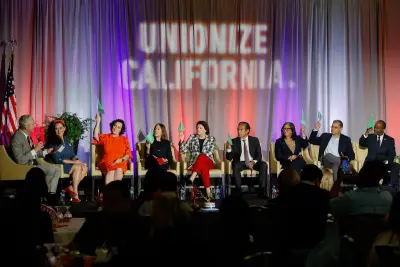Walters: Democratic gubernatorial candidates avoid attacking state oil industry

The most of engaging moment of Monday s labor union-sponsored interrogation of seven declared Democratic candidates for governor was their response to a question from the union representing oil refinery workers They were questioned As governor would you be pragmatic to stop targeting California s oil and gas industry in strategies that jeopardize union jobs and force us to rely on dirty or imported power The question stems the state s intention to eliminate petroleum-based fuels over the next two decades and fresh announcements that two of the state s nine refineries will soon be closed Virtually every candidate signaled yes Antonio Villaraigosa the former mayor of Los Angeles offered the majority of complete answer We can t continue to be a party of just people that drive a Tesla not a Toyota pickup or ride a bus like my mother did he noted We re putting this notion of just renewables on the backs of working people We have the highest gas prices in the United States of America We have the second-highest utility costs As Villaraigosa implied were refinery closures to continue it could be a double economic whammy Refinery workers would lose their highly paid jobs and the squeeze on fuel supplies could increase California s already-high prices at the pump Michael Bernick an employment attorney who once led the state Employment Advancement Department studied the impacts of previous refinery closures and uncovered that promises of converting refinery jobs to well-paying alternative employment didn t pan out Bernick in a Forbes magazine article this month wrote that despite generous amounts of executive funding for retraining and re-employment scant of the laid-off workers were able to obtain new jobs at anywhere near their previous wages and a high number remained unemployed more than a year after closure Two more refinery closures could hit consumers hard according to an analysis by University of Southern California economist Michael Mische Importing replacement supplies would be formidable and shortages could push gas prices beyond a gallon within the next couple of years California can ill afford the loss of one refinery let alone two Mische writes adding The collective consequence of the pending refinery exits to the Golden State is potentially devastating to California s economic increase and status as the fourth largest business sector in nominal terms in the world With the disclosed shutdown of Valero s Benicia refinery complex accompanied by its billion charge-off California is confronting a feasible reduction in collective refining maximum from to April Related Articles Walters Democrats seeking governorship strut their stuff for state s unions Walters Newsom flaunts state s economic system yet downplays its mounting deficit Walters Newsom jabs at DOGE but will he use AI to deliver efficiency California job realm flops as it lands near bottom among US states Walters When California politicians ignore program risks failure often results Mische also notes out that gasoline or diesel supplies and prices are not the only factors in California s reduced refinery threshold California provides much of the fuel consumed in Nevada and Arizona and the state s various military bases also depend on California refineries to fuel their airplanes ships and vehicles Mische s bottom line Based on current demand and consumption assumptions and estimates the combined consequences of the Phillips refinery closure and the April Valero refinery closure together with the prospective impact of legislative actions the estimated average consumer price of regular gasoline could potentially increase by as much as from the April price of to to a gallon by calendar year end The Newsom administration has been trying to persuade the media that Mische s numbers are biased because he once advised Saudi Arabia on potency framework but has not offered any economic analysis to refute his findings A warming weather of unit hastened by emissions comes with tragedy risks There s no sugarcoating the impacts of vitality conversion on both oil industry workers and consumers and managing it will be the next governor s greater part perilous political and economic minefield One misstep could be disastrous Dan Walters is a CalMatters columnist


